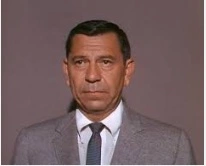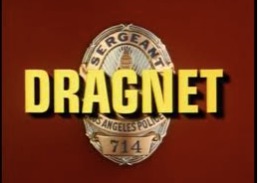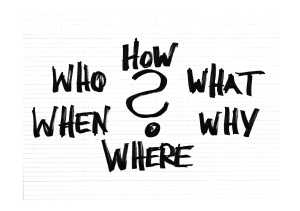 “Just give me the facts, ma’am, only the facts!” Joe Friday would intone as he questioned a witness on Dragnet. At least that’s what my family thought they heard as we gathered round the TV and watched Sgt. Friday speedily solve every crime.
“Just give me the facts, ma’am, only the facts!” Joe Friday would intone as he questioned a witness on Dragnet. At least that’s what my family thought they heard as we gathered round the TV and watched Sgt. Friday speedily solve every crime.  It turns out he never said it quite that way, but Joe certainly asked his questions in a pointed, no-nonsense manner. We all knew the world he lived in was filled with either or’s, goods or bads, fact or fiction and the program showed it to us in bold relief, as stark in contrast as the black and white of our TV screen.
It turns out he never said it quite that way, but Joe certainly asked his questions in a pointed, no-nonsense manner. We all knew the world he lived in was filled with either or’s, goods or bads, fact or fiction and the program showed it to us in bold relief, as stark in contrast as the black and white of our TV screen.
The truth of this reality started with the infamous Dragnet theme which set the tone. Horns blared, “Dum da Dum dum, Dum da Dum dum, Dummmm.” A voiceover would begin, “The story you are about to see is true. The names have been changed to protect the innocent,” and the horns would blare again, ominous, true, the facts. The theme became so synonymous with the guilty being caught for a crime, if any kid I knew got in trouble we would all sing, “Dum de Dum dum.” That kid was toast! Joe Friday ALWAYS got his man. Link to the Dragnet Theme
 After the commercial, we returned to a view of LA. Joe would state: “This is the city, Los Angeles, California, I work here. I carry a badge. It was Friday July 15th. It was sunny in Los Angeles; we were working Day Shift in the Robbery Division. The Captain was John Smith. My partner’s name is Bill Gannon. My name’s Friday.” Then, Joe would recite the facts of the crime, “We were working a series of hold-ups at Mom and Pop stores….”
After the commercial, we returned to a view of LA. Joe would state: “This is the city, Los Angeles, California, I work here. I carry a badge. It was Friday July 15th. It was sunny in Los Angeles; we were working Day Shift in the Robbery Division. The Captain was John Smith. My partner’s name is Bill Gannon. My name’s Friday.” Then, Joe would recite the facts of the crime, “We were working a series of hold-ups at Mom and Pop stores….”
We’ve come a long way from black and white TV and the monochromatic society of my 50s and 60s childhood, but sadly and unfortunately, many in our world, in America, and in our policing have not moved into the broader more nuanced world of color.
First, for those of you who don’t know me well, my father-in-law was an FBI agent and my Godfather and beloved Uncle Eddie was a police officer. I am a clinical social worker and teacher, but while I lean liberal on social issues (with the dose of accountability that makes me an independent), I have run a juvenile probation program. I support law enforcement.
 P.R.I.S.M. (Probation, Rehabilitation, Intensive Services and Management) reflected the innovative approaches our Probation Commissioner, Mary Winter, and Law Enforcement in general attempted in Syracuse, New York. My oversight of PRISM involved not only responsibility for an integrated team of youth probation officers, county residential placement staff, and our non-profit’s social workers, but also made me a member of the management team for the Commissioner. I got closer to an insider’s view of law enforcement than the average person.
P.R.I.S.M. (Probation, Rehabilitation, Intensive Services and Management) reflected the innovative approaches our Probation Commissioner, Mary Winter, and Law Enforcement in general attempted in Syracuse, New York. My oversight of PRISM involved not only responsibility for an integrated team of youth probation officers, county residential placement staff, and our non-profit’s social workers, but also made me a member of the management team for the Commissioner. I got closer to an insider’s view of law enforcement than the average person.
The PRISM staff cross-trained, which meant our social workers had to take peace officer training and succeed at it. Going into the home of a teenage offender was no joke. And our Law Enforcement staff took our agency training, including conflict management. We approached our youth and their families as a team.
As a part of my work, I learned the juvenile justice data on youth who go to jail for offenses versus youthful offenders who go to diversion programs (like PRISM). 67% of those incarcerated are more likely to commit crime as adults.(MIT Brown study) and end in the adult system than those who receive intervention.
From National Institute of Justice data: “The prevalence of [youth] offending tends to peak in the teenage years and then decline in the early 20s. This bell-shaped age curve, universal in Western populations, varies in significant ways. The curve for violence tends to peak later than that for property crimes. Girls peak earlier than boys. The curve is higher and wider for young males (especially minorities) growing up in the most disadvantaged [families and] neighborhoods. A majority have learning disabilities.”
 You see, these are also facts, but they are more than the facts of the crime Joe Friday went looking for. Poverty, family makeup (the presence of a father in the home), age of the mother at the birth of the child, histories of abuse and domestic violence, all played a role in teen offending.
You see, these are also facts, but they are more than the facts of the crime Joe Friday went looking for. Poverty, family makeup (the presence of a father in the home), age of the mother at the birth of the child, histories of abuse and domestic violence, all played a role in teen offending.
In Syracuse, three times more boys than girls were on juvenile probation, but the girls who offended had the greatest problems, often having experienced sexual abuse. While Syracuse is a typical city, 25% African-American, 66% of those on Probation in the PRISM program were black, poor, and from disadvantaged neighborhoods. Few lived with their fathers.
With the addition of unemployment and completion of high school, these issues can also be seen in statistics on crime, arrests, and incarceration for adults.
So, while Joe was right: it is the facts that are needed for criminal trials, Sgt. Friday was also wrong. More and more, law enforcement focuses on community policing, on building relationships with community members. Officers with this training learn to focus on feelings not just facts, especially in neighbors stressed by the social issues I listed.
However, by this I don’t mean to imply that the police should be made responsible to solve the social, economic, and mental health issues that desperately need resolution. Chief Brown in Dallas has addressed that eloquently.
 At the same time, for the current generation of Sgt. Fridays in the best departments, their training addresses not only how to get to the facts needed for prosecution, but also how to de-escalate a conflict, how to negotiate, and how to build enough trust in a community that people will talk to police and give them the facts. You cannot do a great job enforcing the law if traffic stops are as ubiquitous and unjust and racially biased as they were in Ferguson, Missouri. Comprehensive training for all law enforcement would be a good start.
At the same time, for the current generation of Sgt. Fridays in the best departments, their training addresses not only how to get to the facts needed for prosecution, but also how to de-escalate a conflict, how to negotiate, and how to build enough trust in a community that people will talk to police and give them the facts. You cannot do a great job enforcing the law if traffic stops are as ubiquitous and unjust and racially biased as they were in Ferguson, Missouri. Comprehensive training for all law enforcement would be a good start.
At the same time, even well-trained Joe Fridays can’t do their jobs alone. We need to support them. We need to learn the facts, all of them, for all our community members including for those who don’t look like us. We all need to be open to listen to issues of racism and act to address them.
 We need to encourage politicians to create insightful, creative, and compassionate policies to address these complex issues. We need to encourage departments to weed out any bad apples. Sgt. Friday was a good guy. The overwhelming majority of officers are like him…and like my Uncle Eddie. Yet, we know that in every profession and walk of life there will be those who cannot do their job well, and we know that bad apples who carry guns cannot be tolerated. At the same time, every community should support their police departments who rely on community members to help deter crime and catch criminals.
We need to encourage politicians to create insightful, creative, and compassionate policies to address these complex issues. We need to encourage departments to weed out any bad apples. Sgt. Friday was a good guy. The overwhelming majority of officers are like him…and like my Uncle Eddie. Yet, we know that in every profession and walk of life there will be those who cannot do their job well, and we know that bad apples who carry guns cannot be tolerated. At the same time, every community should support their police departments who rely on community members to help deter crime and catch criminals.
We also need to fully fund the police and programs that address the underlying issues. I would certainly advise exploring an integrated and collaborative approach like we used in PRISM, (which won a Vera Institute of Justice award for its effectiveness at deterring further crime by those in it.) It is vastly cheaper to do that than pay the financial costs of prisons, and, as Chief Brown noted, the societal costs of using law enforcement as the vehicle to address racism, poverty, poor education, no jobs, mental illness, and addiction.
Those are the facts…as Sgt. Friday could tell you…just the real facts.

Perfect Joanne. A problem needs to be looked at from very many angles in order to come to a fair and honorable solution.
LikeLiked by 1 person
Thanks, Bernadette, for that generous compliment. I debated about writing it, but hoped people would see it as balanced.
LikeLiked by 1 person
Eloquently said, Jo. The challenges are complex and require comprehensive solutions that might seem costly at first until we balance them against the cost to victims, the cost of justice and incarceration, and the cost in the wasted lives of the perpetrators and the stress on families and children. The wake is broad and lasts through generations. The responsibility belongs to everyone.
LikeLiked by 1 person
I agree. I so hope some good will hope our of all that has happened
LikeLiked by 1 person
I type so poorly on my phone. That was meant to say I hope some good will come of all these deaths and we will finally begin to address the bigger issues
LikeLiked by 1 person
This makes much more sense 😀
LikeLiked by 1 person
Joanne, excellent post, and I wish we had simple solutions to these mammoth social problems.
Going to take all of us talking, working, listening, to find our way to solutions that work.
LikeLiked by 1 person
I think we have to all work together to have a chance and pay for real help not just prisons.
LikeLike
Great post 👏🏻
LikeLiked by 1 person
Thank you!
LikeLiked by 1 person
I, too come from a family of police: grandfather, uncle, 5 cousins. It is tough for the families of police every day and I’m sure it is a frightening time for them right now. We need to send out the right message to them: we truly appreciate the work they do to make our communities better places for everyone and we, in turn, will support them. Thanks, Jo. And I loved that show. too. CLare
LikeLiked by 1 person
Our commonalities keep coming up. I remember if my uncle had a night shift my aunt would stay up and wait for him. She didn’t say she was worried but In retrospect I think that kept her awake. We really do need to support them and train them.
LikeLiked by 1 person
The training is crucial if we don’t want to see our police making poor decisions which create disastrous situations. I’ve seen a marked improvement here in RI in the past decade, but I still remember my uncle and cousins negative reactions when the first woman joined the citpolice force many decades ago. And now one of those cousins’ daughter is on the force! And the family is very proud of her accomplishments. If I head to NC next year, I will make it a point to meet up with you so we can chat face-to-face for a whole day! 😊
LikeLiked by 1 person
Absolutely…though it may take more than a day for the two of us!
LikeLiked by 1 person
🤔
LikeLiked by 1 person
I really would love the opportunity to meet you and Charlie…wish we didn’t live so far apart…and I think you would like Edenton, and find it reminded you of Kingston in ways only an old villages can, with a touch of Southern charm at the same time. You really are a kindred spirit! Love our conversations, Jo
LikeLiked by 1 person
I’m certain we will meet because nice things like that always happen to me,sometimes just by chance. Save up your stories for a marathon chat. 💜 Clare
LikeLiked by 1 person
💕💕💕
LikeLiked by 1 person